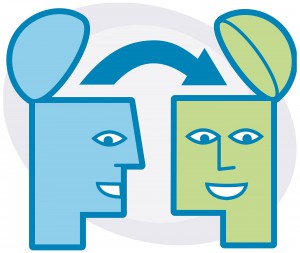 In this post, regular guest blogger Jay Shaw looks at 5 key innovations that are bringing the practice of knowledge translation into the future.
In this post, regular guest blogger Jay Shaw looks at 5 key innovations that are bringing the practice of knowledge translation into the future.
A colleague of mine recently told me that she asked a psychology professor at a large university what his knowledge translation strategies were, and the professor replied, “I’m paid to write papers – knowledge translation is not my job”.
But I doubt that’s a very familiar phrase these days. In a world where money is tight in every corner of public service, the kinds of health research that best defend their value are those that have a clear, measured impact on health and health care.
Although we should most definitely take the time to ask ourselves how this perhaps narrow focus on the immediate value of research might erode the possibilities of future discovery, we are nonetheless put in a position where we have to truly attend to putting our knowledge to work. And like most health researchers I know, I’m in this line of work to make some kind of positive difference in the way health care happens in real, everyday life.
So here’s a top 5 list of knowledge translation innovations, as determined by a keen observer:
5. Social media
Well, evidence suggests that higher numbers of tweets of academic papers lead to more peer-reviewed citations. While this is a “new” knowledge translation strategy that jumps right onto the social media bandwagon, the extent to which it engages knowledge users is questionable. Are health care leaders and practitioners following new publications on Twitter? What impact would that have anyway? These questions need more attention if social media is to be advanced as a legitimate method of knowledge translation.
4. Developmental evaluation
Although not conventionally understood as a method of “knowledge translation”, developmental evaluation has immense potential to facilitate meaningful impact in directions that are suggested by more formal academic research. Developmental evaluation can bring insights from established research into complex social environments to encourage innovation that resonates with particular contexts. Instead of trying to “control” for context, this approach recognizes the crucial importance of context for making knowledge translation work.
3. “Integrated” knowledge translation
A huge step in the right direction, this cousin of participatory action research includes knowledge users as key partners throughout the entire research process – from developing the research questions through to interpreting the implications. The research is then already in part “owned” by the participants, who are in a much better position to bring the findings to life than if they are simply informed about them after the study is finished.
Tied for 1st place:
1. Arts-based knowledge translation
Now we’re getting to the good stuff. Arts-based approaches to knowledge translation break the mold of traditional academic health research, and so scare off a lot of well-meaning researchers. However, this is one of the most powerful approaches to encouraging deep reflection on health care and clinical practice as a result of academic research, demonstrated by Pia Kontos and colleagues in their work on client-centered rehabilitation. If you want to see an example of knowledge translation that creates deep and lasting change in practice, check this out.
1. Committed and tireless advocacy
This approach to knowledge translation stands out for two reasons:
First, it looks beyond the findings of a single study, a single research group, or a single discipline. Committed advocates use their own research as a complement to vast fields of literature that support their cause, leveraging whole bodies of knowledge to create change over and above individual research projects.
Second, advocacy makes a concerted effort to “speak truth to power” and create large-scale, lasting change. Generally focused at the level of policy, advocacy work takes issues represented in research literature and pushes them to center stage.
Voicing local truths in combination with research findings about key issues related to society, health and care, advocates leverage all the resources at their disposal to “translate” their knowledge for those in positions of power. Need an example? Check out Danielle Martin on universal health care (watch at least until the 4:00 minute mark – it’s great).
And so, when you consider what to do with the findings of your next research project, pause for moment and consider the bigger picture: how might your work help to build an advocacy movement that makes large-scale, lasting change? Even those first few moments of thought are steps toward great “knowledge translation”.
You can follow Jay on Twitter: @jayshaw29
Comments